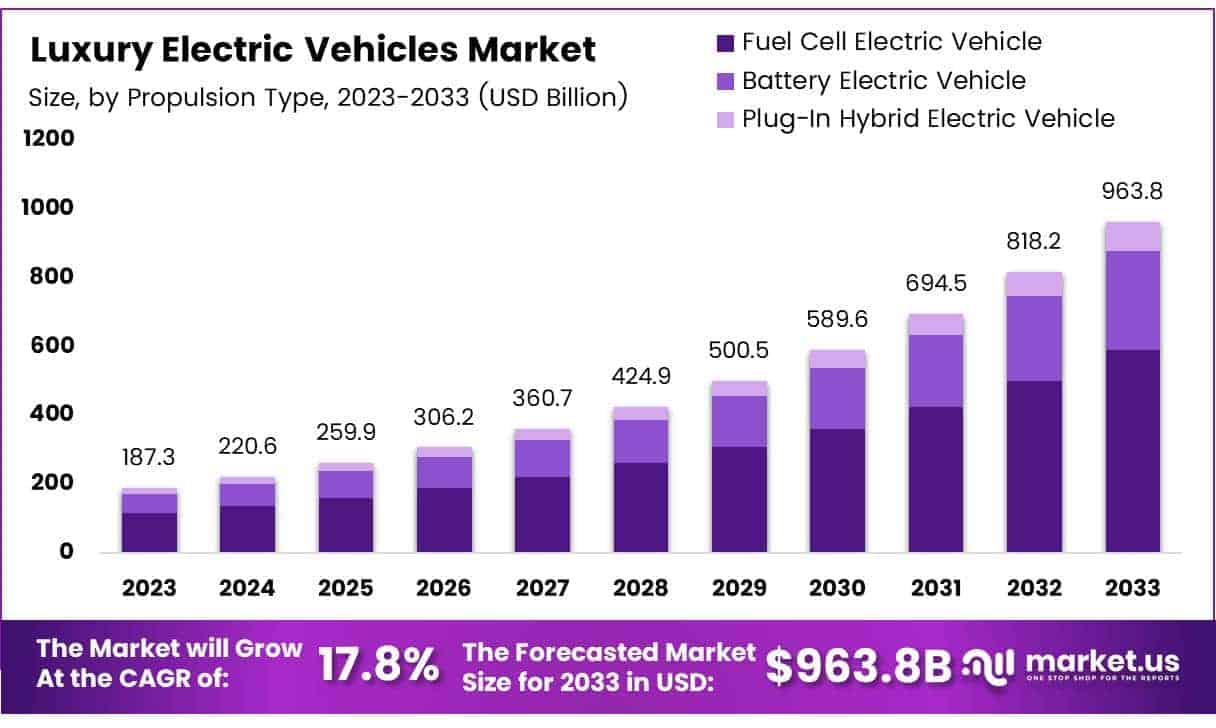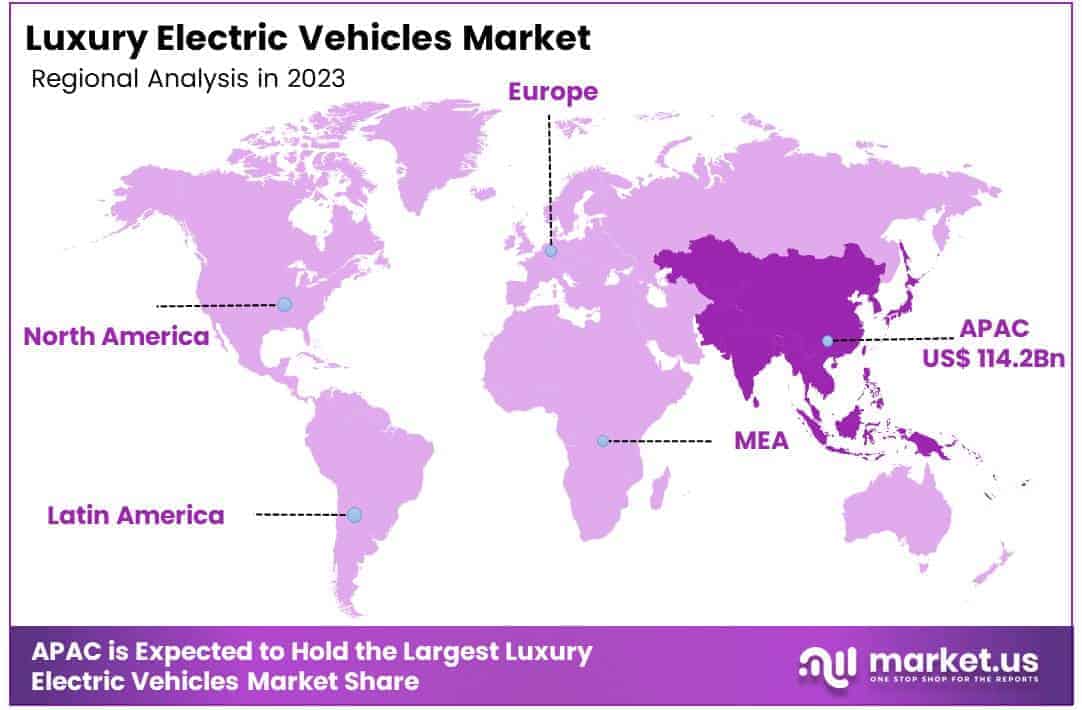Table of Contents
Introduction
New York, NY – March 24 , 2025 – The Global Luxury Electric Vehicles (EVs) Market is projected to reach approximately USD 963.8 billion by 2033, rising from an estimated USD 187.3 billion in 2023. This growth is anticipated to occur at a compound annual growth rate (CAGR) of 17.8% over the forecast period spanning 2024 to 2033.
Luxury Electric Vehicles (Luxury EVs) represent a premium segment within the electric mobility industry, characterized by high-performance, technologically advanced, and aesthetically refined vehicles powered entirely by electric drivetrains. These vehicles not only reflect environmental consciousness but also deliver superior comfort, cutting-edge features, and an enhanced driving experience.
The Luxury Electric Vehicles Market refers to the global ecosystem comprising manufacturers, technology providers, and end users engaged in the development, production, and sale of high-end electric vehicles across various segments including sedans, SUVs, and sports cars. Market growth is being significantly driven by rising environmental awareness, stringent government regulations on vehicular emissions, and increasing disposable incomes among affluent consumer segments.
Additionally, advancements in battery technologies particularly in terms of energy density, charging speed, and lifecycle have enhanced vehicle range and performance, making luxury EVs a more practical and appealing choice for consumers. The demand for luxury EVs is further supported by the expanding network of fast-charging infrastructure and the integration of innovative features such as autonomous driving, AI-based systems, and personalized in-car experiences. Key automotive players are actively investing in the electrification of their premium product lines, which is fostering intense competition and accelerating technological innovation.
Opportunities are particularly strong in emerging markets, where rapid urbanization and government incentives are encouraging EV adoption among the luxury segment. Furthermore, the transition of traditional luxury car manufacturers toward electrification is expected to open new revenue streams and expand market penetration. Overall, the Luxury Electric Vehicles Market is poised for robust growth, underpinned by sustainability trends and evolving consumer preferences toward clean and intelligent mobility solutions.

Key Takeaways
- The Global Luxury Electric Vehicles Market is projected to grow from USD 187.3 billion in 2023 to USD 963.8 billion by 2033, expanding at a CAGR of 17.8% during the forecast period 2024–2033.
- In 2023, Fuel Cell Electric Vehicles (FCEVs) held the largest share by propulsion type, accounting for 65.3% of the luxury EV market.
- Cars constituted 90.1% of the luxury electric vehicle market in 2023, driven by rising consumer preference for premium electric mobility combined with sustainability considerations.
- Asia Pacific emerged as the dominant regional market, capturing 61% of the global luxury EV market share in 2023, valued at approximately USD 114.25 billion.
Request a Sample Copy of This Report at https://market.us/report/luxury-electric-vehicles-market/request-sample/
Luxury Electric Vehicles Statistics
- The electric vehicle (EV) industry is valued at $500.48 billion.
- There are more than 40 million electric vehicles currently on the road.
- Over 6 million plug-in EVs are sold every year worldwide.
- Battery electric vehicles (BEVs) made up over 70% of the growth in 2022.
- The number of EVs increased by 60% in 2022, reaching 26 million.
- EVs are expected to represent 46% of light vehicle sales by 2025.
- This share is projected to rise to 68% by 2030.
- By 2035, EVs may account for 83% of global light vehicle sales.
- Norway has the highest share of new EV registrations globally.
- China has over eight times more public EV chargers than any other country.
Emerging Trends
- Integration of Autonomous Driving Features: Luxury EV manufacturers are increasingly incorporating advanced driver-assistance systems, with some models achieving Level 3 autonomy, allowing for hands-free driving under certain conditions.
- Expansion of Charging Infrastructure: Investments in fast-charging networks are enhancing the convenience of luxury EV ownership, addressing previous concerns about charging accessibility.
- Collaborations for Technological Advancements: Partnerships between luxury automakers and technology firms are fostering innovations in battery technology and vehicle connectivity, leading to improved performance and user experiences.
- Customization and Bespoke Options: There is a growing trend among luxury EV manufacturers to offer personalized features, allowing customers to tailor vehicles to their preferences, thereby enhancing exclusivity and brand loyalty.
- Electrification of Classic Models: Companies are converting classic luxury cars into electric vehicles, blending timeless design with modern sustainability, appealing to affluent consumers seeking unique, eco-friendly options.
Top Use Cases
- Urban Commuting: Luxury EVs provide a quiet and smooth driving experience, making them ideal for daily commuting in urban environments.
- Long-Distance Travel: Advancements in battery technology have extended the range of luxury EVs, making them suitable for long-distance journeys without frequent charging stops.
- Corporate Fleets: Businesses are adopting luxury EVs for executive transportation, aligning with corporate sustainability goals and projecting a modern image.
- Chauffeur Services: The comfort and prestige associated with luxury EVs make them popular choices for high-end chauffeur and limousine services.
- Leisure and Tourism: Luxury EVs are being utilized in the tourism industry, offering eco-friendly and premium transportation options for tourists seeking sustainable travel experiences.
Major Challenges
- High Production Costs: The development and manufacturing of luxury EVs involve significant expenses, impacting profitability and pricing strategies.
- Charging Infrastructure Limitations: Despite improvements, the availability of fast-charging stations remains uneven, particularly in less urbanized areas, affecting consumer confidence.
- Battery Supply Constraints: The increasing demand for EVs has led to competition for battery materials, potentially causing supply bottlenecks and increased costs.
- Technological Integration: Incorporating advanced technologies, such as autonomous driving features, presents challenges related to safety, regulation, and consumer acceptance.
- Market Competition: The entry of new players and the rapid evolution of technology intensify competition, requiring continuous innovation and differentiation.
Top Opportunities
- Development of High-Performance Models: There is a growing market for luxury EVs that offer superior acceleration and handling, attracting performance enthusiasts.
- Expansion into Emerging Markets: Introducing luxury EVs in emerging economies with increasing affluent populations presents significant growth potential.
- Sustainable Luxury Initiatives: Emphasizing the use of eco-friendly materials and sustainable manufacturing processes can enhance brand appeal among environmentally conscious consumers.
- Aftermarket Services and Upgrades: Offering exclusive services, software updates, and customization options can create additional revenue streams and strengthen customer loyalty.
- Integration with Renewable Energy Solutions: Collaborations with renewable energy providers to offer integrated home charging solutions powered by clean energy can enhance the value proposition of luxury EVs.
Key Player Analysis
The global luxury electric vehicles (EVs) market in 2024 is being significantly shaped by key players demonstrating robust innovation, strategic partnerships, and expanding production capabilities. Tesla, Inc. continues to dominate due to its advanced autonomous technologies, global Supercharger network, and strong brand equity in premium EVs. BYD Auto Co., Ltd. has gained momentum by aggressively expanding in Europe and Southeast Asia, supported by vertical integration and cost-effective luxury EV offerings.
Volkswagen AG is capitalizing on its diversified brand portfolio, particularly through Audi and Porsche, while BMW AG maintains competitiveness with its growing i-series lineup, emphasizing performance and design. Hyundai Motor Company and Kia Corporation are strengthening their premium EV positions through the E-GMP platform, delivering improved range and innovation. AB Volvo leverages safety-centric design and sustainability positioning. Meanwhile, Ford Motor Company and Toyota Motor Corporation are gradually scaling luxury EV production. Audi AG is accelerating its transition to full electrification with high-end technology integration.
Top Key Players in the Market
- Tesla, Inc.
- BYD Auto Co., Ltd.
- Volkswagen AG
- BMW AG
- Hyundai Motor Company
- AB Volvo
- Ford Motor Company
- Toyota Motor Corporation
- Kia Corporation
- Audi AG
Purchase Your Premium Research Report Now! https://market.us/purchase-report/?report_id=133898
Regional Analysis
Asia Pacific Leads Luxury Electric Vehicles Market with 61% Share in 2024
In 2024, Asia Pacific dominated the global luxury electric vehicles market, accounting for 61% of the total market share, valued at approximately USD 114.25 billion. This leadership is primarily driven by strong demand in countries such as China, Japan, and South Korea, supported by government incentives, expanding EV infrastructure, and a rising affluent population. China remains the key contributor, with a robust manufacturing base and policy support. The region’s focus on sustainable transportation, coupled with increased investments in premium EV technologies and features, continues to drive growth. Asia Pacific is expected to maintain its lead in the coming years.

Recent Developments
- In 2023, Stellantis N.V. confirmed a strategic move by investing nearly €1.5 billion to acquire around 20% stake in Leapmotor. This investment positions Stellantis as a key shareholder in the Chinese electric vehicle firm. As part of the agreement, both companies formed Leapmotor International, a joint venture led by Stellantis with 51% control. The venture holds exclusive rights to export, sell, and manufacture Leapmotor vehicles outside Greater China. This collaboration marks a unique step in the global EV sector, bridging a major global automaker with a Chinese pure-play NEV manufacturer.
- In 2023, Lucid Group, Inc. introduced a new addition to its electric sedan lineup, the Lucid Air Pure RWD. This model brings a strong combination of luxury, long driving range, and a more affordable price. With a maximum range of up to 410 miles, the vehicle reflects Lucid’s continued focus on performance and design. The launch completes the Air series, offering customers a well-balanced EV at a base price of $77,400. The announcement followed the Lucid Air’s recognition as the 2023 World Luxury Car Award winner.
- In 2023, Volkswagen, Stellantis, and Glencore extended support to ACG, a UK-listed SPAC, in acquiring Brazilian mining assets. The transaction, valued at US$1 billion, includes Atlantic Nickel and Mineração Vale Verde. These mines produce key materials such as nickel sulfide and copper, which are essential for EV batteries. The extracted minerals will be processed in Europe and North America, reinforcing a reliable supply chain for electric vehicles across Western markets.
- In 2023, Hozon Auto, a Chinese EV manufacturer, began preparations for a Hong Kong stock listing. The company selected China International Capital Corporation and Morgan Stanley to lead the IPO, which is expected to raise up to $1 billion. Prior to this, Hozon secured 7 billion yuan in pre-IPO funding. The public listing aims to strengthen its financial base and support its future growth plans in the competitive EV landscape.
Conclusion
The luxury electric vehicles market is witnessing strong growth, driven by rising environmental concerns, evolving consumer preferences, and continuous advancements in EV technology. Increased investment by automakers, supportive government policies, and expanding charging infrastructure are accelerating adoption across key regions. Demand is further boosted by innovations in battery efficiency, autonomous driving, and personalized features, positioning luxury EVs as both sustainable and premium mobility solutions. While challenges such as production costs and infrastructure gaps persist, the market outlook remains optimistic, supported by global electrification trends and a growing focus on clean, intelligent transportation.
Discuss your needs with our analyst
Please share your requirements with more details so our analyst can check if they can solve your problem(s)





